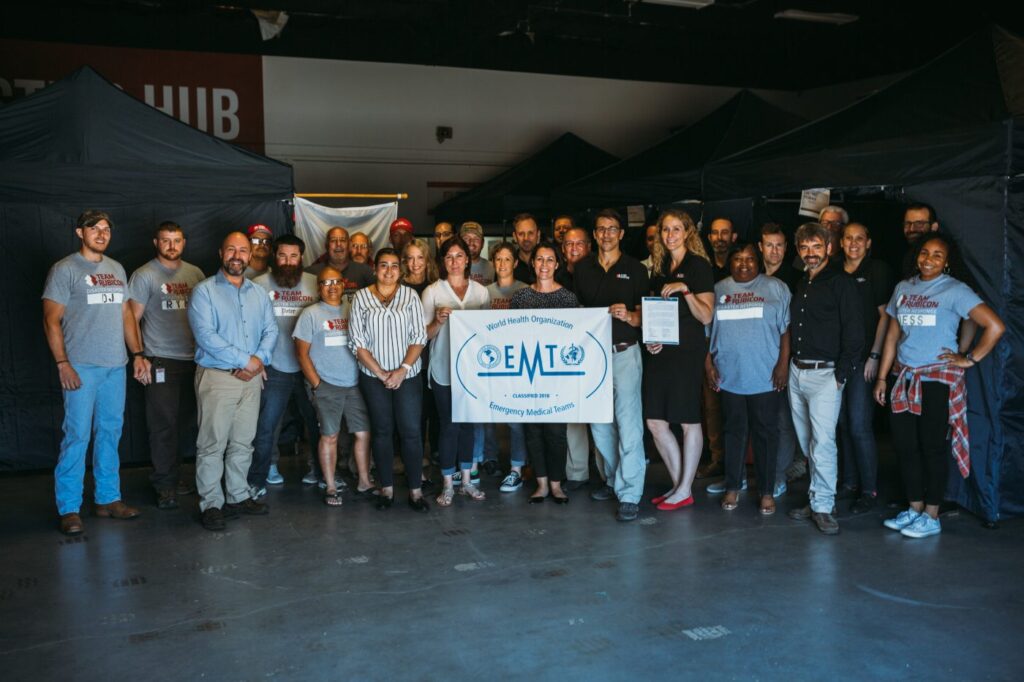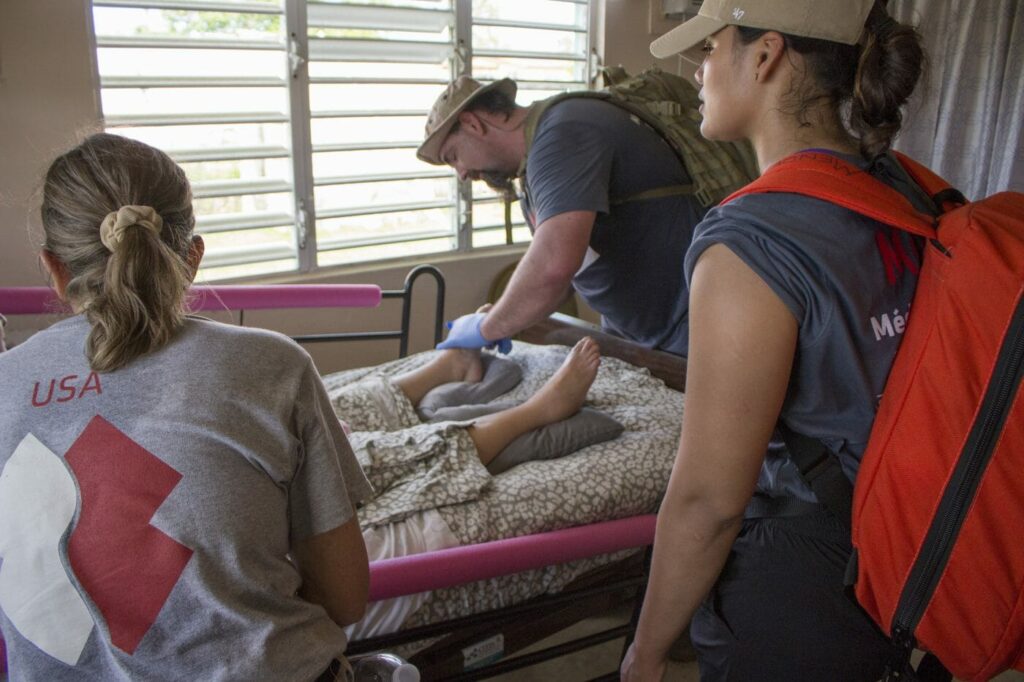At the end of June, the World Health Organization visited Team Rubicon’s National Operations Center in Dallas, Texas, as the final step in the certification of the Emergency Medical Team Type 1 mobile verification. The certification was the culmination of more than two and a half years of work of professionalizing Team Rubicon’s medical capability, and Team Rubicon is the first NGO in North America to receive this WHO certification.
Erin Noste, M.D. led Team Rubicon’s certification process and worked closely with WHO-appointed mentor Bronte Martin, who is with the Northern Territory Government (Australia).
Corey Eide, Field Operations with Team Rubicon, who also worked on this certification process explained, “WHO has minimum standards that cover medical protocols, such as medical staff working within the scope of their practices, and technical aspects, that cover equipment, supplies and processes to keep staff safe.” In fact, the 91-page WHO certification manual has numerous quality standards to meet and its technical standards include the areas of initial assessment and triage, resuscitation, patient stabilization and referral, wound care, fracture management, anesthesia, surgery, intensive care, communicable disease care, maternal health, child health, chronic disease emergency care, mental health, rehabilitation, laboratory and blood bank, pharmacy and drug supply, radiology, sterilization, logistical support, FMT type specificities and FMT capacities and capabilities.

Team Rubicon has two EMT Type 1 teams that can support distinct outpatient mobile clinics, and the WHO site visit confirmed Team Rubicon’s preparedness, plus advised the teams on additional actions to take. Eide said that the certification “was a forcing function to dot all of our i’s and cross our t’s and to make our protocols and actions replicable across all operations.” As part of the certification, the Team Rubicon teams can see and treat 100 patients per day total for 14 consecutive days.
This certification “gives us access to more and more complex disasters and crises in the world,” Eide said. “We will have more frequent opportunities and in more complex environments. For example, we have been asked to go to the Congo to help with the Ebola crisis.” (Team Rubicon did not send teams for that crisis though because it lacked a sufficient number of fluent French speakers.) Eide stressed that Team Rubicon needs more medical volunteers, especially ones who are multi-lingual.
Team Rubicon emergency medical mobile clinics can pop up in all kinds of places. Sometimes the clinic may be in a gym or even a tent, depending on the disaster and the situation.
Gabriel Quinones-Medina, who deployed as a medic to his home territory of Puerto Rico after Hurricane Maria, explains, “Each day we would send strike teams out to different locations. Each strike team typically consisted of four or five people comprised of a doctor, medics and nurses. We traveled to remote areas that had very little resources where we knew people needed medical help and medication.”
Quinones-Medina said that primary care offices were closed and hospitals were difficult to get to and “people felt abandoned and were dying from lack of medicine and medical care.” He called TR’s impact in Puerto Rico “immediate” and recalled how grateful people were. “Most people had no means of paying for their medical needs so when they realized what we were offering was free, they were relieved. Team Rubicon cared for more than 1,000 patients by the end of the op.
An example of the work that the teams had to do and the creative ways they rose to challenges can be seen in the following story. Quinones-Medina said that an elderly man in Puerto Rico needed a breathing treatment and had audible wheezing. This type of treatment is usually given by a nebulizer, which requires an electricity source. But the area of Puerto Rico the team was working in had no power and no hospital was nearby. “We brought a power inverter with us so we could power the nebulizer through the car battery,” Quinones-Medina said. “But it failed to work. So we had to come up with a solution on the spot. In an austere environment, you have to make things work with the little resources you have.” He and a respiratory therapist named Brian created a nebulizer out of an artificial manual breathing unit (AMBU) bag and synchronized their technique with the man’s breathing to deliver the medicine. The man got better and was relieved and grateful. And Quinones-Medina said he was reminded why he was on the op.

In addition to providing immediate disaster medical response, Team Rubicon’s Emergency Medical Teams sometimes work with host-country military plus the U.S. Navy to do clinical care, joint subject matter expert exchanges for education (such as CPR and disaster response tactics) and disaster coordination meetings where Team Rubicon learns from local communities how they plan for and respond to disasters. Operation Continuing Promise in Guatemala, run by on-site medical director John Roberts, is one example of a joint clinic.
As a result of Team Rubicon’s Emergency Medical Team Type 1 mobile verification, Dr. Noste will serve as a mentor to another NGO going through the same process. Eide called the mentorship of Team Rubicon by Martin and Noste’s upcoming mentorship of another organization “healthy pressure” that helps provide continuing education. Recertification of the Team Rubicon Emergency Medical Team by WHO will be conducted every five years.
The WHO EMT initiative was launched after experiences in the 2010 Haiti earthquake response. Its purpose is to professionalize and standardize the delivery of health services following disasters. The process also seeks to build national health systems’ capacity to lead the activation and coordination in the immediate aftermath of a disaster. This initiative will improve communication and collaboration during disasters and ensure that critical, life-saving aid is delivered where it’s needed most and that these efforts are neither duplicated nor wasted.
Interested in joining Team Rubicon’s medical team? Join Team Rubicon and learn more and apply in Roll Call.



